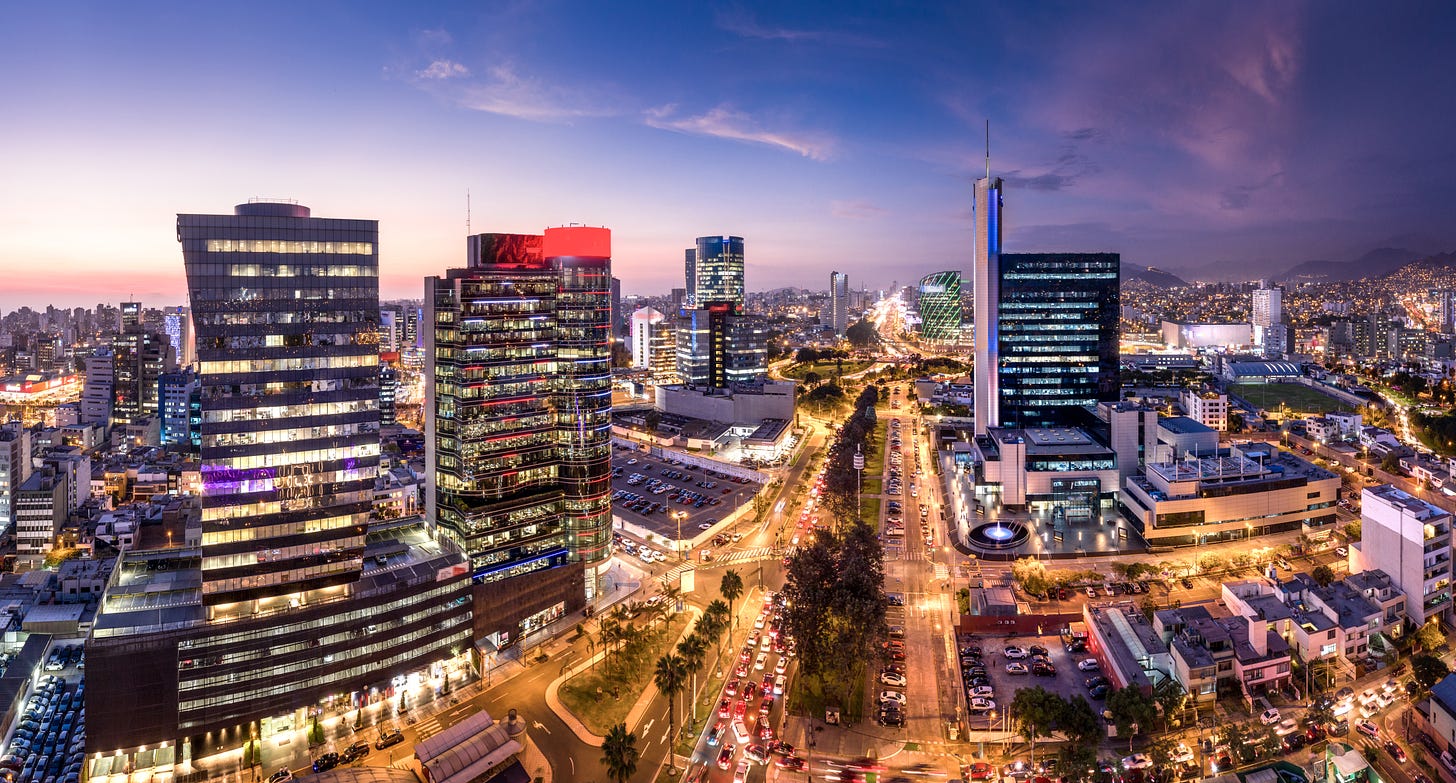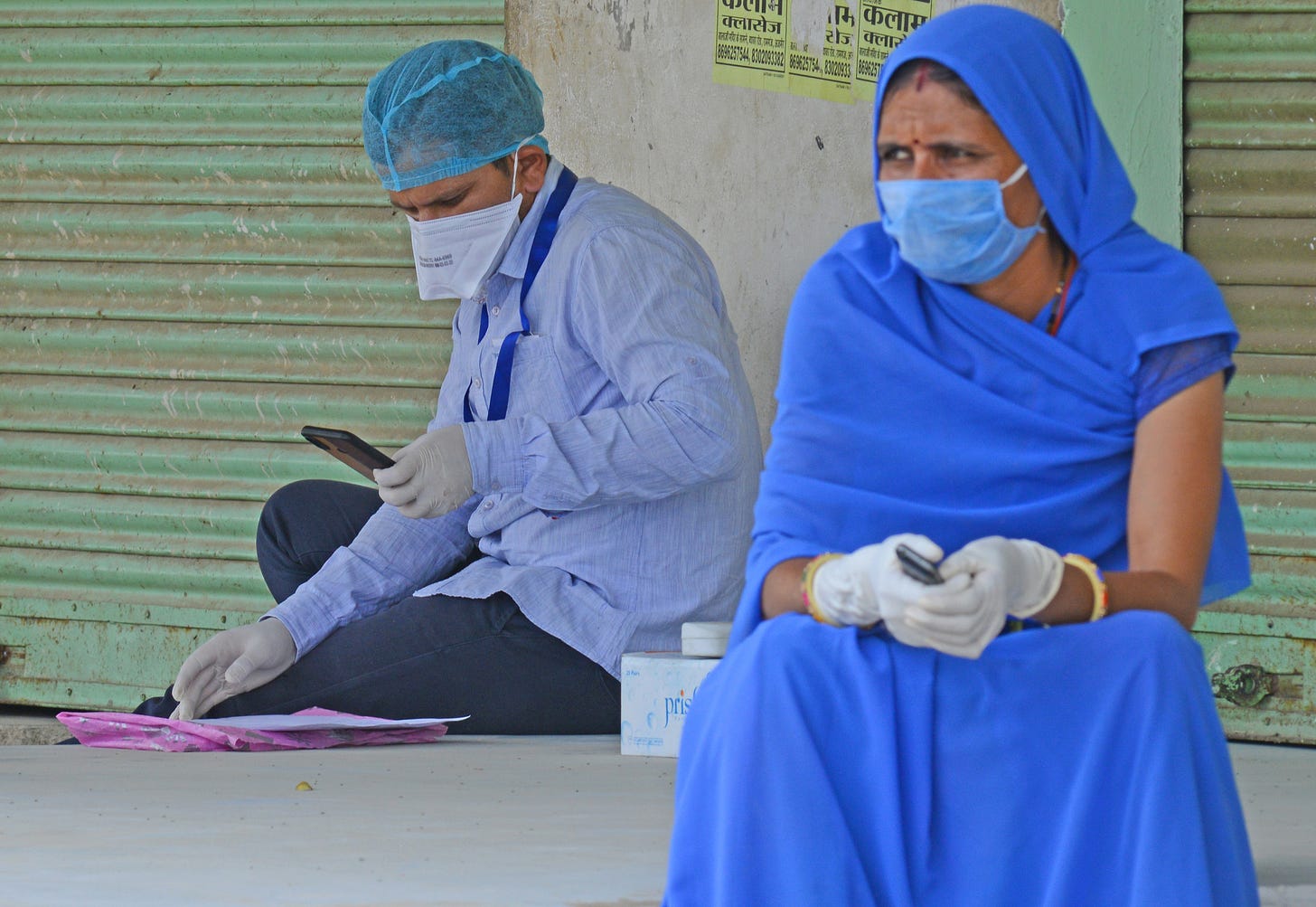Emerging Markets Daily - January 19
The Top Emerging Market ETFs, Turkey and UAE In Currency Swap, India Omicron Cases Drop, Indonesia's SOE Privatizations, Trafigura in Major DRC Mining Deal
Peru, Colombia, and Saudi Arabia Lead Emerging Market ETF Returns YTD
Among Emerging Market country ETFs, Peru, Colombia, Saudi Arabia and Chile are off to sizzling starts, and Greece and Qatar are not far behind this year. Turkey is rebounding.
Emerging World
It’s still too early to tell where emerging markets equities are headed, but the year 2021 only underscored the importance of differentiation across markets. After all, China’s markets had a rough year, but a general index of Indian equities posted strong gains.
General emerging markets indexes were dragged down by China given its heavy weighting in most diversified EM portfolios. China still makes up nearly 1/3 of the MSCI EM index, and this is often reflected in passive EM portfolios or ETFs.
But if you have a conviction on a particular country, take a look at specific country ETFs. Seeking Alpha has a useful regularly updated list of EM ETFs, though it’s missing a couple of big ones, including Saudi Arabia.
So, which country ETFs are off to a strong start in 2022?
Peru and Colombia are off to sizzling starts, followed by Saudi Arabia, Chile, Greece and Qatar.
The iShares MSCI All Peru Capped ETF ((Ticker Symbol: EPU) is up more than 13% on the year already, and the Global X MSCI Colombia ETF (GXG) is up 10.6%. Not far behind are ETFs for Saudi Arabia (8.9%), Chile (8.1%), Greece (7.1%), and Qatar (6%). For 2021, the top Middle East equities performers were the UAE and Saudi Arabia.
Turkey is also rebounding from a rough year. The one year iShares MSCI Turkey ETF shows TUR down 29.1%, but if you got in on January 1, you’re riding a modest rebound. It’s up 4.3% year to date.
It’s a rebound that may have legs. Yes, Turkey still has a significant debt problem and a President with erratic views on monetary policy, but Erdogan has signaled a softer line on interest rate cuts that has calmed markets. Also soothing to markets: a return to rapprochement with regional adversaries, including Israel and the United Arab Emirates.
The UAE began its own regional rapprochement process over the last year and markets have responded. The UAE had one of the strongest equity markets in the world in 2021. The iShares MSCI UAE ETF is up 28.5% over the past year.
Here are the top 6 EM ETFs from Seeking Alpha on Year-to-Date Returns (as of today, Jan 19)
Peru (EPU) - 13.2%
Colombia (GXG) - 10.6%
Saudi Arabia (KSA) - 8.9%
Chile - (ECH) - 8.1%
Greece - (GREK) - 7.1%
Qatar - (QAT) - 6.0%
For more on Emerging Market ETFs, check out Seeking Alpha’s page.
- Afshin Molavi
Turkey, UAE Sign Nearly $5 Billion Foreign Currency Swap Agreement
Bloomberg
“Turkey signed a $4.9 billion currency swap agreement with the United Arab Emirates, boosting dwindling foreign-exchange reserves depleted by the country’s financial turmoil.”
“The three-year deal reflects a warming of ties that began last year after a decade of frosty relations that rippled across the Middle East. Turkey has already signed swap deals with Qatar, South Korea and China to prop up its reserves, which shrank more than 10% in December as the central bank intervened in the foreign-exchange market to stem the lira’s decline.”
“Reserves totaled just under $110 billion on Jan. 7, according to official data, but fall significantly below zero when the central bank’s liabilities from swap deals with foreign counterparts or commercial lenders are stripped out. The lira, meanwhile, still lost about 40% of its value last month alone, when investors fled lira assets in search of protection against a worsening inflation outlook.”
“The run on the currency began after the central bank started a cycle of interest rate cuts in September at President Recep Tayyip Erdogan’s demand. Erdogan argues that lower borrowing costs will curb price pressures, contrary to what most central bankers think.”
“The deal folowed a visit by the UAE’s de facto ruler, Sheikh Mohammed bin Zayed Al Nahyan, to Turkey in November. Relations between the countries had been strained over the role of Islamist groups in the tumult that followed the 2011 Arab Spring uprisings. The countries also supported opposing sides in Libya’s conflict, and have disagreed on other issues including gas exploration in the eastern Mediterranean.” Onur Ant reports.
Covid Cases Drop Sharply in Major Indian Cities
Wall Street Journal
“Covid-19 cases in New Delhi and Mumbai have fallen sharply in recent days as a surge of the Omicron variant peaks in some of India’s biggest cities, raising hopes that prior infections will offset a relatively low vaccination rate and help prevent a repeat of last year’s catastrophic wave.”
“India is still a few weeks away from a nationwide peak, as the virus continues to spread in rural areas and smaller cities, according to doctors and public-health experts, who also warn that daily hospitalizations and deaths will likely continue climbing even as infections slow down.”
“Even so, they say the early signs point to a less severe wave than last year’s, when India’s hospitals ran out of beds, oxygen and medical supplies, leaving many people to die at home, and forcing crematoriums to work around the clock.”
“In New Delhi—India’s second biggest city—new cases have dropped for five days straight after hitting a high of 28,867 last Thursday. In Mumbai, the financial capital and most populous city, 6,149 new daily infections were reported on Tuesday, after a peak of 20,971 cases on Jan. 7. Officials in both cities say that about 80% of hospital beds are empty.” WSJ reports.
Indonesia Rolls out Ambitious Consolidation, Privatization Program for SOEs
Nikkei Asia
“From food and tourism to crude oil and geothermal energy, Indonesia's Ministry of State Owned-Enterprises is pushing consolidation and initial public offering plans this year, highlighting national priorities in driving post-pandemic recovery in Southeast Asia's largest economy.”
“The government last week launched two new state holding entities, InJourney and ID Food. The former now oversees state-owned enterprises in tourism-related businesses including airport operators Angkasa Pura I and II, as well as a network of 120 hotels nationwide. The latter includes several companies in the food sector.”
“InJourney was initially planned to include flag carrier Garuda Indonesia as well, but that has reportedly been put on hold due to the airline's financial troubles. ‘This restructuring ... is a must because there are many SOEs with their subsidiaries and sub-subsidiaries running tourism [businesses], but they have been walking on their own, unconsolidated and therefore weak,’ President Joko Widodo said at InJourney's launch. ‘With consolidation through the holding [entity], they can emerge as a big power. The holding must make its SOE members more agile and professional.’”
“Widodo added that the international motorbike circuit MotoGP race, as well as the Group of 20 Summit and related meetings that Indonesia is hosting this year, are ‘a golden moment’ that tourism-related SOEs must take advantage of to accelerate consolidation.” Nikkei Asia reports.
Shalina and Trafigura Sign $600 Million DRC Mining Agreement
African Business
“A $600m financing agreement between Shalina Resources, one of the largest producers of copper and cobalt and Trafigura, the commodity trading giant, is set to considerably increase supplies of high-grade cobalt hydroxide and copper cathode from the Democratic Republic of Congo (DRC).”
“Demand for the metals, particularly cobalt – an essential component of batteries used in mobile phones and increasingly in electric vehicle batteries – has been rising steeply.”
“According to analysts, global refined cobalt production is expected to reach 223,000 tonnes in 2025, a rise of 38.5% from 2021. The DRC is the world’s largest supplier of cobalt, producing around 70% of the metal.” African Business reports.
“If you think you are too small to make a difference, try sleeping with a mosquito.”
― Dalai Lama XIV





